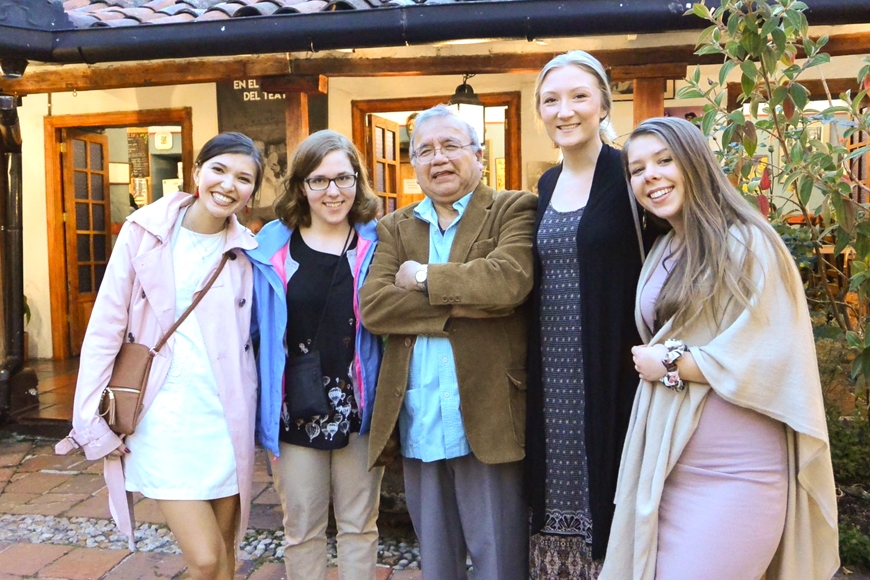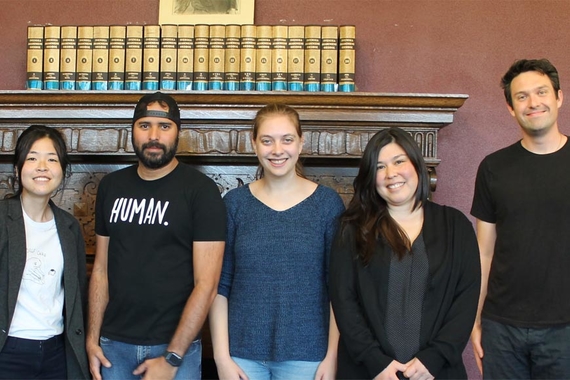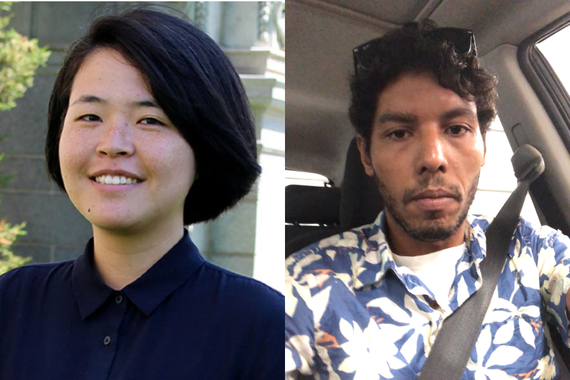The Thirst for Justice
On January 12, 2008, the 26-year-old son of Luz Marina Bernal Porras, Fair Bernal Porras, was executed by the far-right Colombian government. Bernal Porras was told her son was killed while in a military officer’s uniform, which she knew couldn’t have happened because her son had autism and would not have been allowed to serve in the military. Her son had been murdered by a corrupt government.
Cases like this weren’t uncommon. Realizing that she wasn’t the only mother who experienced tragedies of this nature, Bernal Porras couldn’t be silent. A decade later, Bernal is one of many mothers in Soacha, Colombia, who have become social activists fighting for the justice that their sons never received.
Through the Undergraduate Research Opportunities Program (UROP) and CLA’s First-Year Research & Creative Scholars Program, students Sydney Provinzino, Olivia Nortwen, and Kylie Sievers traveled to Soacha with Spanish & Portuguese studies professor Luis Ramos-Garcia to interview these mothers about how losing their sons transformed them from small-town citizens to social activists.
The False Positives
In 2016, a 52-year civil war came to an end in Colombia. Between 2001-2008, the far-right President Alvaro Uribe offered incentives to soldiers (such as increased pay, more time off, and better living conditions) to “turn in” more bodies from the opposing political party, the rebel guerillas. In an effort to inflate the body count, the soldiers would lure young, poor, and/or mentally ill men from impoverished communities with the promise of work to remote parts of the country and execute them. These men were then disguised as rebel guerillas killed in battle and presented to the government, for no reason other than to receive their promised incentives. This would eventually become known as the “false positives” scandal.
Soon after this practice became a norm, inconsistencies arose. Some men were turned in with bullet holes in their bodies, but not their uniforms. Others would have a weapon in their right hand when they were left-handed. Still, others had medical conditions that would have prevented them from enlisting in the army. Mothers in the small town of Soacha began to demand answers about their sons’ disappearances from the civilian courts and military, but to no avail.
When these mothers started to speak out, they received threats against their daughters, too. Meanwhile, the courts and the police prolonged the cases of their missing sons, told the mothers that evidence was lost, and transferred the cases to other court systems in an effort to conceal the government’s corruption.
In the “false positives” scandal, more than 3,000 young men were executed. The mothers of these sons have yet to achieve justice. As one mother puts it, “we don’t live; we exist because our sons are no longer here.”
Theater as a Platform to Demand Justice
These mothers have found a unique tool to raise awareness of the false positives scandal: theater.
As actresses in the plays, the mothers use their late sons’ old toys and belongings as props on stage to showcase their tragic stories. The mothers perform these plays in Bogotá, the capital city of Colombia, in what is known as Festival de teatro alternativo, an artistic movement that strives to bring light to social issues and progressivism in the midst of traditional, upper-class theater. Some of the mothers’ plays have been performed worldwide, including in Minnesota. They hope that the international attention will pressure the Colombian government to respond to their pleas for justice.
Not Silenced
In a country that’s trying to silence them, these mothers are speaking out and leading a movement to foster social change across their nation.
That’s where Sydney Provinzino, Olivia Nortwen, and Kylie Sievers come in. For their CLA freshmen research grants, Nortwen and Sievers (now sophomores) were assigned to work with Professor Luis Ramos-Garcia based on their abilities to write and speak in Spanish, as well as their interest in declaring a Spanish studies major. He gave them each a choice: to sift through papers in a library or to come to Colombia and participate in a movement. Not surprisingly, they chose the latter option. Provinzino, a senior (now graduated), had been an active participant and impeccable student in one of Ramos-Garcia’s classes. Her academic achievements eventually earned her the UROP-Grand Challenges Grant.
Ramos-García, who received a prestigious UMN Grand Challenges Research Grant for “Social Justice Through Collaborative Artistic Expression: The State of Iberoamerican Studies Series: Human Rights Across the Disciplines and Voice to Vision Project” has been working with these mothers in an effort to bring attention to their stories. The students helped to facilitate that work by interviewing and speaking with the mothers about their experiences and hopes for the future—something the three students described as a “really emotional process.”
The Student Experience and Future
Grappling with that emotional element was the biggest challenge for the three students. Nortwen recalls thinking “How am I here right now?” She remembers sitting across from one of the mothers, crying as she listened to her tragic story. “I was not expecting to experience something so big like this my freshman year,” she remembers.
Sievers is more determined than ever to engage with issues of social justice through her study of Spanish, “I absolutely want to continue learning about Latin American culture and these issues,” she says, “I declared my major [in Spanish] a month later.”
Provinzino explains that her liberal arts education influenced her thinking on worldviews. She mentions that her trip to Colombia showed her the resilient and positive sides of Colombian culture, despite the negative aspects, stereotypes, and corruption the media may depict of the country. “You can’t generalize an entire country of people based on a few groups,” she explains.
These three Spanish studies students experienced an invaluable education abroad thanks to not only the research grants, but to the long-practiced work of the Spanish and Portuguese studies department.
This research trip is believed to be the first CLA unit that has included undergraduate freshmen students in a well-seasoned research team. Ramos-Garcia will bring a new group of students to Colombia in April 2019.
Nortwen, Sievers, and Provinzino presented their work at the 2018 Undergraduate Interdisciplinary Conference, where they received the award for Best Scholarly Presentation.
The mothers of Soacha continue their fight for justice. Bernal Porras is now running for the nation’s Senate to continue her activism on behalf of the Colombian people. She was also a Colombian candidate for the Nobel Peace Prize and came in second after the left-wing Colombian President Juan Manuel Santos. With the recent end of the civil war, the conflict finally seems to be over, and a beacon of hope is on the horizon with new elections and anticipated political change.
This story was written by an undergraduate student content creator in CLAgency. Meet the team.



